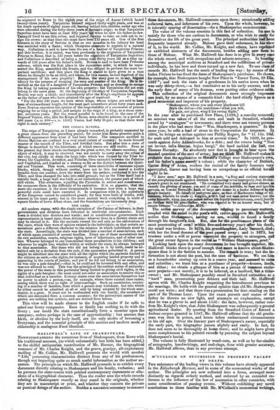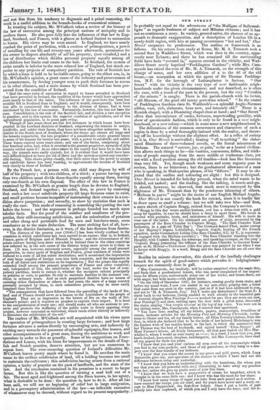SOCULLOCH ON SUCCESSION TO PROPERTY VACANT BY DEATH.
THE substance of the leading views in this volume have already appeared in the Edinburgh Review, and in some of the economical works of the author. The principles are now collected into a focus, arranged more distinctly as regards orderly method, and enforced by an extended re- ference to the influence of the law of succession in other countries, with some consideration of passing events. Without exhibiting any novel conclusions to those familiar with Mr. M'Culloch's economical writings,
and not free from his tendency to dogmatic and a priori reasoning, the work is a useful addition to the branch-books of economical science.
In treating his subject, Mr. M'Culloch takes a review of the history of the law of succession among the principal nations of antiquity and in modern times. He also goes fully into the influences of that law in Eng-
land, Scotland, and France, with a glance at Ireland limited to succession to leases. His views may be soon stated. In England, we have nearly
reached the point of perfection, with a custom of primogeniture, a power
of entailing for one life and twenty-one years afterwards, permission for the owner to dispose absolutely of all his property, (not entailed,) and a law of distribution which divides personal property equally among all the children but limits real estate to the heir. In Scotland, the system of strict entails is inferior to the more relaxed law of England, but much su- perior to any projects of compulsory partition. The rule of Scottish law by which a lease is held to be heritable estate, going to the eldest son, is, in Mr. M'Culloch's opinion, a great cause of the industry and perseverance of his countrymen, by forcing younger sons to push their fortunes in towns or in other climates, and a main means by which Scotland has been pre- served from the condition of Ireland.
"lied the same rules of succession in regard to leases prevailed in Scotland that have prevailed in Ireland, the condition of the former would have approached
more nearly to that of the latter. The influence of the poor-laws has been less
sensibly felt in Scotland than in England; and it would, consequently, have been less able to countervail the tendency to the division of farms, had it been sanctioned by the law of succession. Fortunately, however, this has not been the case. Consolidation is the role of the Scottish law, and division a rare exception in practice; and to this system the superior condition of agriculture, and of the agricultural population, is in great part owing. "Though of late years there are but few instances in which leases have been granted in the Lowland districts of Scotland, empowering the tenants to assign, subdivide, and sublet their farms they have not been altogether unknown. In a district in the South-west of Scotland, where the farms are almost all large and
the tenants respectable, the late proprietor of a considerable estate granted leases to some of his tenants for twenty-one years, with a power to subdivide and sublet. These leases expired some years since; and one of the farms comprising about four hundred acres, had, when it reverted to the present proprietor, upwards offifty tenants settled upon it ! As no other estate in the county had been let in the same way, the tenants were easily ejected; but it is evident that it would have been very difficult indeed to have got rid of them had the system acquired any consider- able footing. This shows pretty clearly, that little more than the power to assign and subdivide farms has been wanting, to approximate the tenants of Scotland very closely to those of Ireland."
By the French law, a person with one child may dispose by will of half of his property ; with two children, of a third ; a parent having more than two children must divide three-fourths equally among them, leaving only one-fourth at his own disposal. The effect of this law in France is examined by Mr. McCulloch at greater length than he devotes to England, Scotland, and Ireland together ; in order, first, to prove by reasoning that such a law must subdivide property till large fortunes cease to exist, and small portions become incapable of maintaining their owners in a con- dition above pauperism; • and secondly, to show by statistics that such is really the case. This mode of reasoning is something like putting the cart before the horse ; and the argument is perhaps founded too much upon tabular facts. But the proof of the number and smallness of the pro- perties, their still-increasing subdivision, and the substitution of potatoes and other cheap and perishable food for corn and butchers-meat, seem conclusive as to the main deduction. The most striking fact of all, how- ever, is the district limitatiOn, as it *ere, of the late distress from famine.
"The distress of the present year (1846-7) has been wholly confined to the countries in which subdivision has been carried to an excess; that is, to Ireland, France, parts of Belgium and of Rhenish Prussia: and the circumstance of the potato culture having been more extended in Ireland than in the other countries now referred to, is the sole cause of the distress being more severe in it than in them. [It was, however, extremely severe, especially among the small peasant proprietors, in many parts of Belgium and France, great numbers of whom were reduced to a state of all but entire destitution; and it occasioned the importation of very large supplies of foreign corn into both countries, and the suspension in both of all duties and restrictions on its importation.] But the potato has rapidly extended itself among the peasant proprietors of France and other countries; and, independent of this, the subdivision of the land, under the law of com- pulsory partition, tends to reduce it, whether the occupiers subsist principally on ,potatoes or corn, to patches fit only to maintain families in the meanest con- dition in ordinary years. And as such pauperized families have no means of assisting either themselves or others in bad years, the state of a large country generally occupied by them, in such calamitous periods, may be more easily imagined than described. "The consequences that have followed from the parcelling of the lands of Ire- land and of France should serve as a beacon to the Legislature of the people of England. They are as impressive as the letters of fire on the walls of Bel- shazzar's palace; and it requires no prophet to explain their import. It is level to the comprehension of every one; and should make all who are anxious to pre- serve and promote the wellbeing of the public unite in firmly opposing every project, however concealed or varnished, which tends either directly or indirectly to stimulate the subdivision of the soil."
The readers of Mr. McCulloch are well acquainted with his views upon the operation of primogeniture in creating large fortunes; and how large fortunes advance a nation directly by encouraging arts, and indirectly by exciting envy towards the possessor of splendid equipages, fine houses, and other accompaniments of a great man, forcing the ambitious to work and speculate in order to live as grandly. Some of his suggestions on Foun- dations and Leases, with his hints for improvements in the details of Eng- lish and Scotch practice, deserve attention, but are too numerous to repeat here. The ever-recurring question of Ireland's difficulties Mr. McCulloch leaves pretty much where he found it. He ascribes the main cause to the endless subdivision of land, till a holding becomes too small to maintain the cultivator ; this subdivision having arisen from a national opinion a laxity of practice on the part of landlords, and the state of the law. ;Ind the conclusion contained in his premises is a resort to larger farms. But this is like the question of turning a mad bull out of a fair. The most aged and frightened among the fliers knows, in her agony, what is desirable to be done : the question is, how to do it. After all has been said, we still see no beginning of relief but in large emigration, and in a peremptory administration of the law—an inflexible execution of whatsoever may be decreed, without regard to its present unpopularity.































 Previous page
Previous page